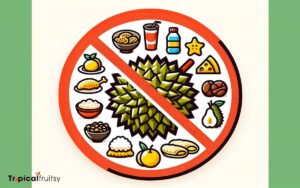Is Durian Illegal in Singapore? Unveiling the Truth!
Durian is not illegal in Singapore, but there are restrictions on its consumption and transport in public areas due to its strong smell.
While it is not against the law to possess or consume durian in Singapore, the country has specific rules regarding where durians can be consumed:
Here is an example of how these rules are implemented: A sign on the Singapore Mass Rapid Transit (MRT) clearly states that ‘No Durians’ are allowed inside the train carriages.
Understanding Singapore’s durian regulations is key to enjoying the fruit without legal or social repercussions.
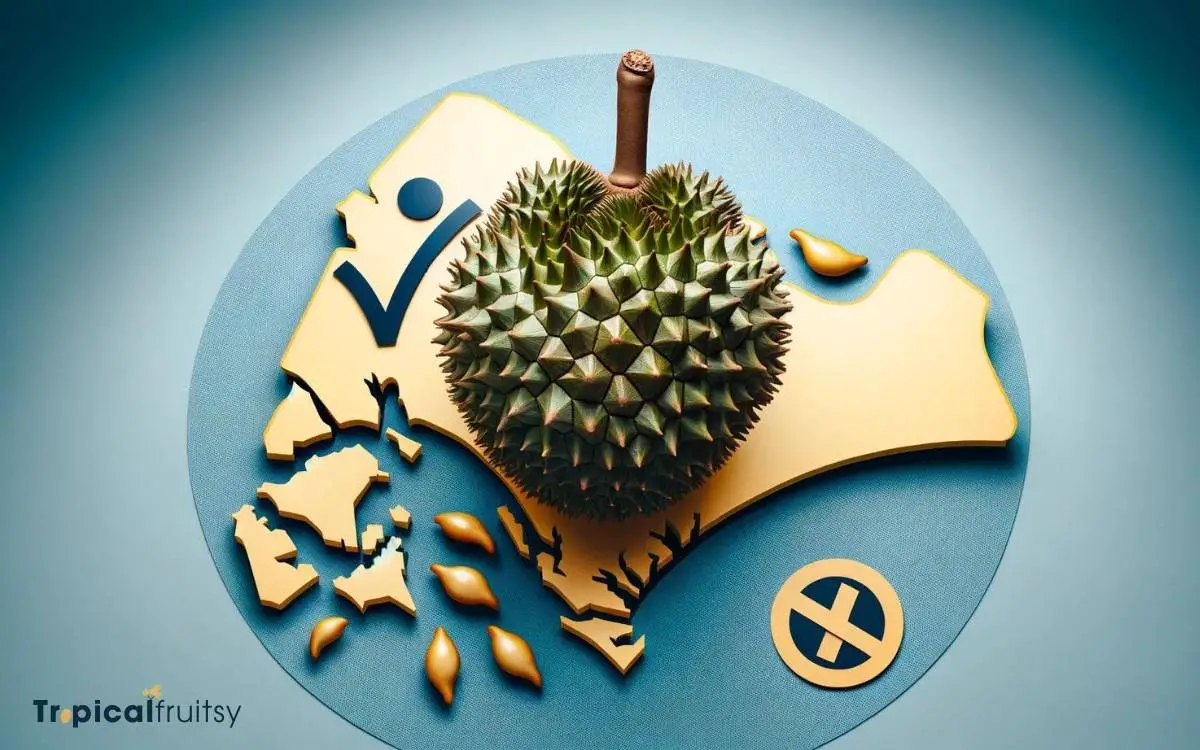
Key Takeaway
Durian Consumption and Transport Regulations in Singapore
| Public Space | Durian Policy |
|---|---|
| MRT and Buses | Not allowed |
| Taxis | Discretionary (some may allow with surcharges) |
| Hotels | Often banned (check with the hotel first) |
| Airports | Not allowed in cabin or as hand luggage |
| Public Parks | Allowed unless specified otherwise |
Understanding Durian Restrictions
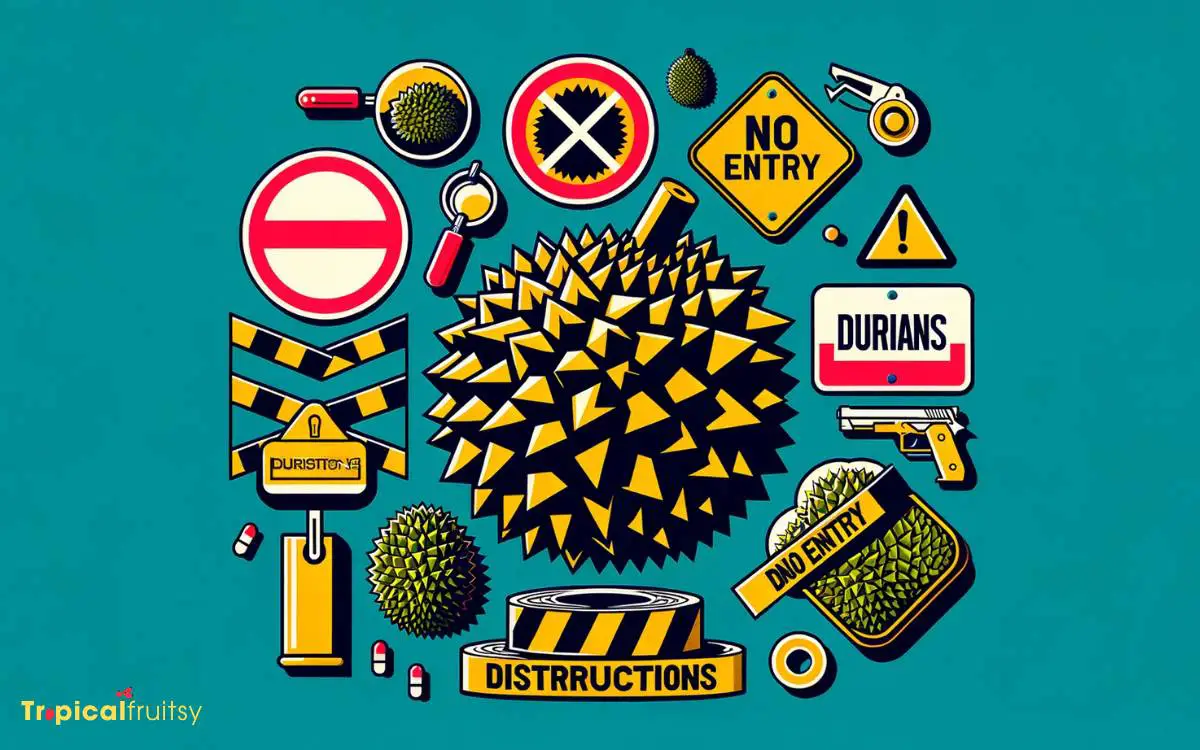
While durian is not illegal in Singapore, several regulations restrict its consumption and transport in specific public areas. These measures stem from the fruit’s pungent odor, which many find overpowering and offensive.
As a result, public transportation systems such as Mass Rapid Transit (MRT) trains and buses, along with certain public venues, have explicit prohibitions against carrying durians.
Signage indicating the ban is prominently displayed, and non-compliance can result in fines.
The rationale behind these restrictions is twofold: to maintain a pleasant and comfortable environment for all users of public spaces, and to uphold the high standards of public hygiene for which Singapore is known.
This approach reflects the broader context of Singapore’s legal landscape, where public order and sensitivities are meticulously managed.
Singapore’s Legal Landscape

Within the context of Singapore’s stringent legal framework, the restrictions on durian in public spaces are consistent with broader policies aimed at preserving public order and cleanliness.
The city-state is known for its meticulous governance and has enacted a range of laws that reflect a commitment to maintaining a high quality of life for its residents and visitors.
These laws include strict littering penalties to ensure clean streets, regulations on public behavior to minimize disturbances, and maintenance of hygiene standards across food outlets.
Such measures underscore Singapore’s analytical approach to urban management, where each rule is carefully crafted and enforced to contribute to the collective well-being.
The legal framework thus extends to public transport systems, which we will examine next in the context of durian transportation.
Public Transport Regulations
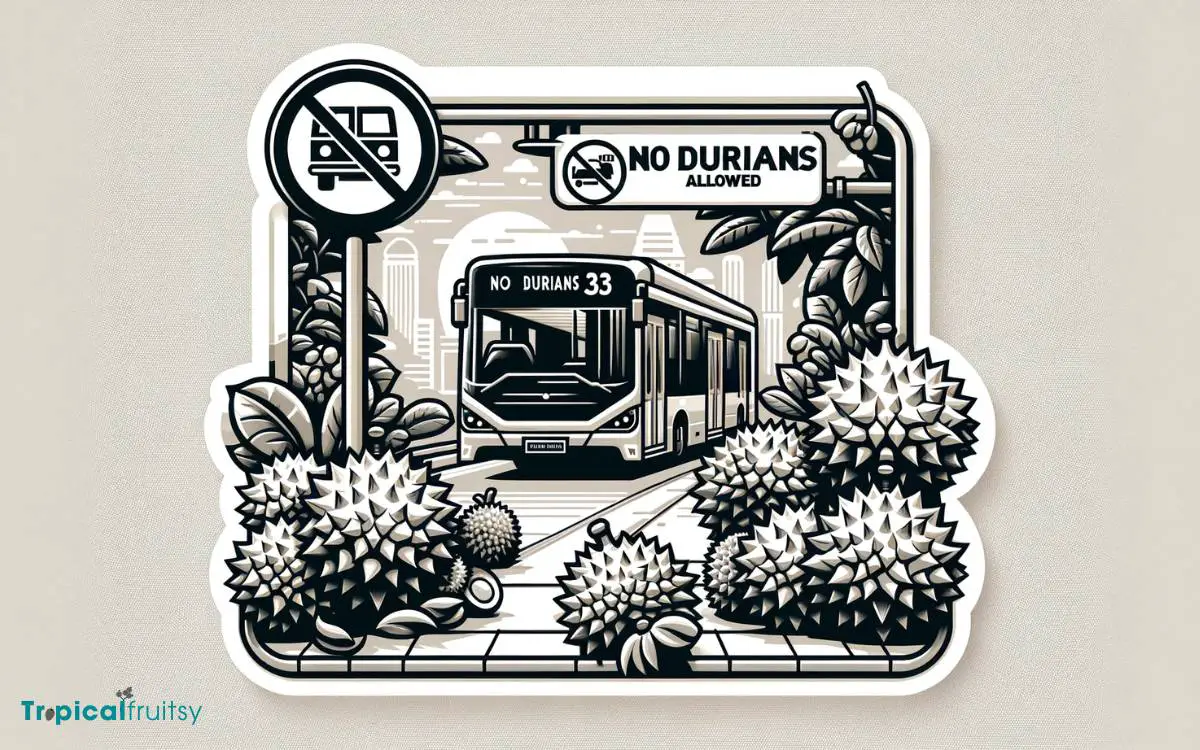
In Singapore, all forms of public transportation strictly prohibit the carriage of durians due to their pungent odor, reflecting the city-state’s commitment to a comfortable and odor-free travel experience for all commuters.
This policy is underscored by stringent enforcement and clear signage, leaving no room for ambiguity regarding the expectations placed upon passengers.
The rationale behind this regulation rests on the potential discomfort that durian odors may cause to fellow travelers, thus prioritizing the collective well-being over individual preferences.
| Transport Type | Durian Prohibition Status | Penalty for Non-Compliance |
|---|---|---|
| MRT (Train) | Strictly Prohibited | Monetary Fine |
| Buses | Strictly Prohibited | Monetary Fine |
| Taxis | Discretionary | Cleaning Fee |
| Ride-Hailing | Discretionary | May Refuse Service |
| Ferries | Strictly Prohibited | Subject to Operator Policy |
In practice, the enforcement of these regulations is managed through vigilant staff and public awareness campaigns, which together ensure compliance and maintain the high standards of public transport in Singapore.
Durian Policies in Hotels

While durian is not prohibited by law in Singapore, the policies of hotels concerning this fruit are driven by considerations for cleanliness and the management of its pervasive odor.
‘No Durian’ signs are a common sight in hotel lobbies, underscoring the strict measures taken to maintain a pleasant environment for all guests.
The enforcement of these policies reflects the hospitality industry’s commitment to high standards of hygiene and customer satisfaction.
No Durian” Signs
Many hotels in Singapore explicitly prohibit the presence of durian on their premises, as evidenced by widely displayed ‘No Durian’ signs.
This measure reflects the stringent standards hotels maintain to ensure the comfort and satisfaction of all guests.
The pungent aroma of durian, while appealing to some, can be overwhelmingly unpleasant to others, permeating fabrics and lingering in enclosed spaces such as hotel rooms.
- Aroma Containment: The policy helps contain the strong scent, which is difficult to remove once it has settled in a room.
- Guest Consideration: It demonstrates a commitment to guest preferences and comfort, acknowledging that the smell can be disruptive.
- Maintenance of Standards: It ensures a neutral olfactory environment, maintaining the establishment’s ambiance and cleanliness standards.
This analytical approach to guest experience underlines the hotels’ priority for quality service and hospitable environment.
Cleanliness and Odor Control
Hotels in Singapore implement durian policies to maintain high standards of cleanliness and control odors that can detract from the guest experience.
These measures are informed by both a sensitivity to the diverse preferences of international guests and a commitment to providing a neutral environment.
The table below illustrates common policies across various hotels:
| Policy Type | Description |
|---|---|
| Prohibition | Explicit ban on durians in hotel premises. |
| Designated Areas | Specific zones for consuming durians. |
| Cleaning Fee | Charges applied for durian odor removal. |
| Durian Packages | Special offers that include durian tastings outside the hotel. |
| Odor Control | Investment in air purifiers and scent management. |
This analytical approach ensures a hospitable environment for all guests. Understanding these policies sets the stage for discussing the fines and penalties explained in the next section.
Fines and Penalties Explained
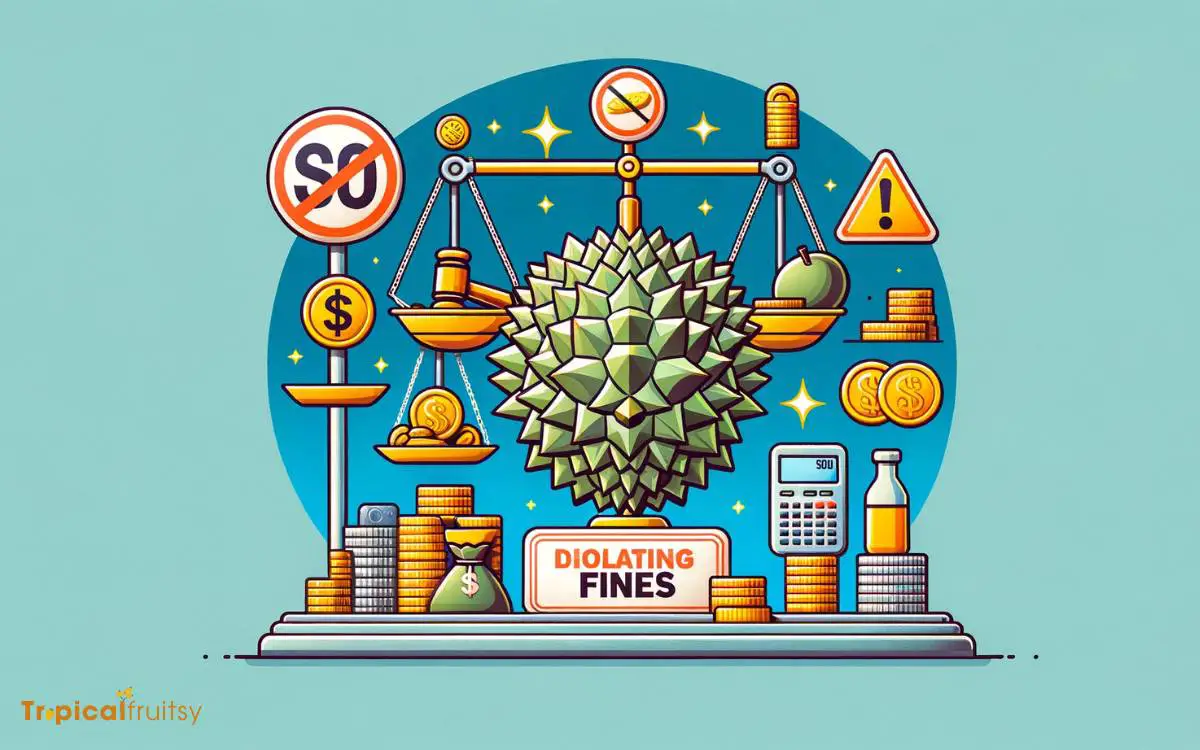
In Singapore, while durian is not broadly illegal, specific regulations impose fines for consuming the fruit in prohibited areas such as public transport and certain hotels.
Monetary penalties for such offenses are established to ensure compliance with public cleanliness and odor nuisance standards.
The enforcement of these penalties is carried out by local authorities, who monitor compliance and issue fines accordingly to maintain public order and amenity.
Durian Ban Locations
Despite its popularity, durian is banned from public transportation and numerous accommodation venues in Singapore, with fines imposed for non-compliance.
The stringent measures are a response to the fruit’s pungent odor, which many find overwhelming.
To maintain a pleasant environment for all residents and commuters, the following locations have strict prohibitions on durian:
- Public Transportation: The Mass Rapid Transit (MRT), buses, and taxis enforce a no-durian policy.
- Hotels and Hostels: Many establishments have clear signage and policies against durian in their premises.
- Rental Properties: Landlords often stipulate a durian ban in lease agreements, potentially leading to forfeited deposits.
Violators may face monetary fines, which act as a deterrent and ensure adherence to these regulations.
The focus on communal comfort justifies these restrictions and illustrates Singapore’s commitment to public convenience.
Offense Monetary Fines
While acknowledging the inconvenience caused by the fruit’s scent, Singapore imposes monetary fines to enforce the durian ban in public spaces, with penalties varying depending on the specific regulations of each location.
These fines are not arbitrary but are instituted as a deterrent against the consumption and transport of durians in prohibited zones such as mass transit systems and hotels.
The fines are commensurate with the severity of the offense and the potential disruption caused by the odor.
The regulatory framework is designed to maintain public order and comfort, reflecting Singapore’s strict stance on public behavior.
Enforcement is systematic, and offenders are typically given a fine that serves as a financial reprimand for non-compliance with the established norms.
Penalty Enforcement Methods
Singaporean authorities rigorously enforce fines for the illicit transport or consumption of durian in public spaces, with specific procedures in place to ensure compliance.
Upon detection of a violation, the enforcement protocol is activated, reflecting a commitment to upholding public sanitation standards and social decorum.
This process includes:
- Issuance of on-the-spot fines by authorized personnel, such as public transport officials or police officers.
- Direction to cease the offending behavior immediately to mitigate further inconvenience to the public.
- A follow-up process for unpaid fines, potentially leading to court actions and additional penalties.
An analytical examination of enforcement methods reveals a system designed to deter non-compliance through swift and certain penalties, maintaining the delicate balance between personal freedom and collective responsibility.
Cultural Attitudes Towards Durian
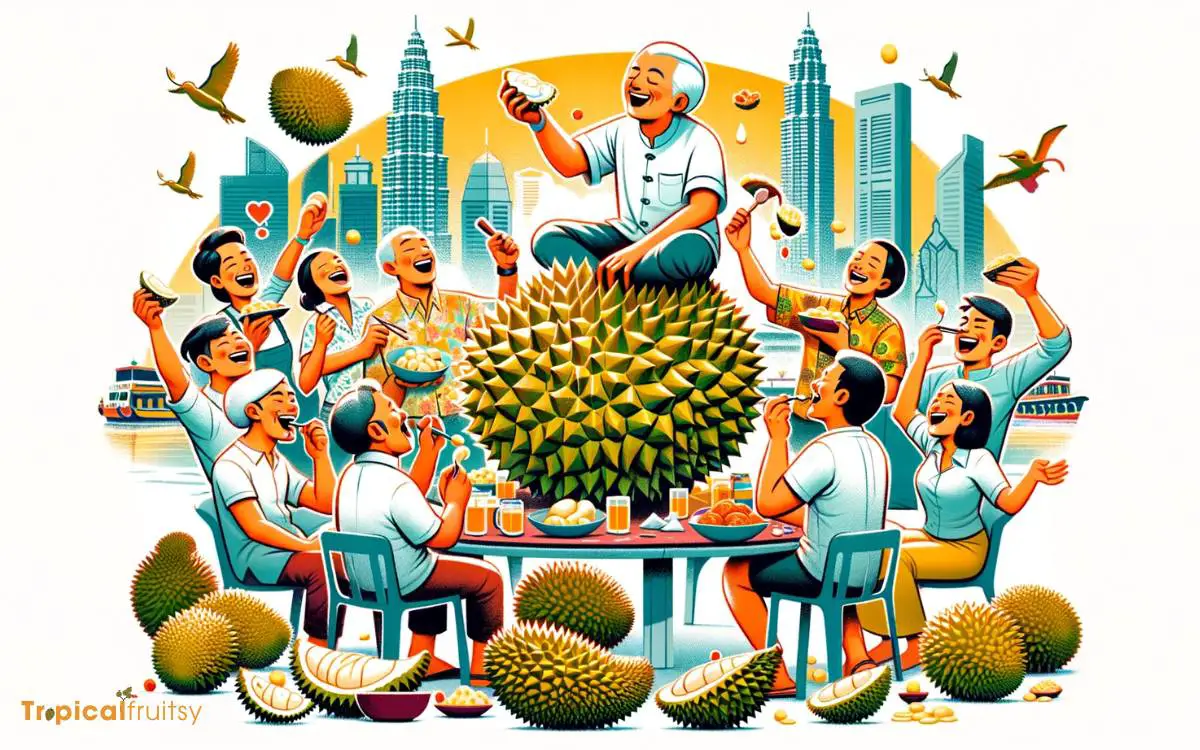
Many residents of Singapore hold a deep-seated appreciation for durian, often hailed as the ‘King of Fruits’ in Southeast Asia, despite its controversial aroma that leads to its ban in certain public spaces.
This dichotomy is emblematic of the cultural significance and polarizing nature of the fruit. Analyzing the public’s sentiment, one observes a spectrum ranging from devout aficionados to vehement detractors.
| Aspect | Affection | Aversion |
|---|---|---|
| Sensory Impact | Rich, creamy taste | Overpowering smell |
| Symbolism | Heritage, festivity | Discomfort, exclusion |
| Consumption | Social, communal | Restricted, private |
Places to Enjoy Durian Legally

Public spaces such as outdoor markets and designated durian zones provide legal venues for individuals to savor the distinctive fruit. Regulations are strategically enforced to balance cultural appreciation with public consideration.
To ensure an environment conducive to both durian enthusiasts and the general public, specific locations have been earmarked where the consumption of durian is permitted without restriction.
Places where one can enjoy durian in Singapore include:
- Durian-specific stalls in hawker centers or fruit markets, where the aroma is part of the atmosphere.
- Specialized durian eateries, which offer a variety of species and preparations.
- Open-air spots near plantations in the countryside, offering a farm-to-table experience.
These establishments and areas are recognized for their compliance with local norms, allowing for an immersive experience without contravening social guidelines.
Myths Versus Reality
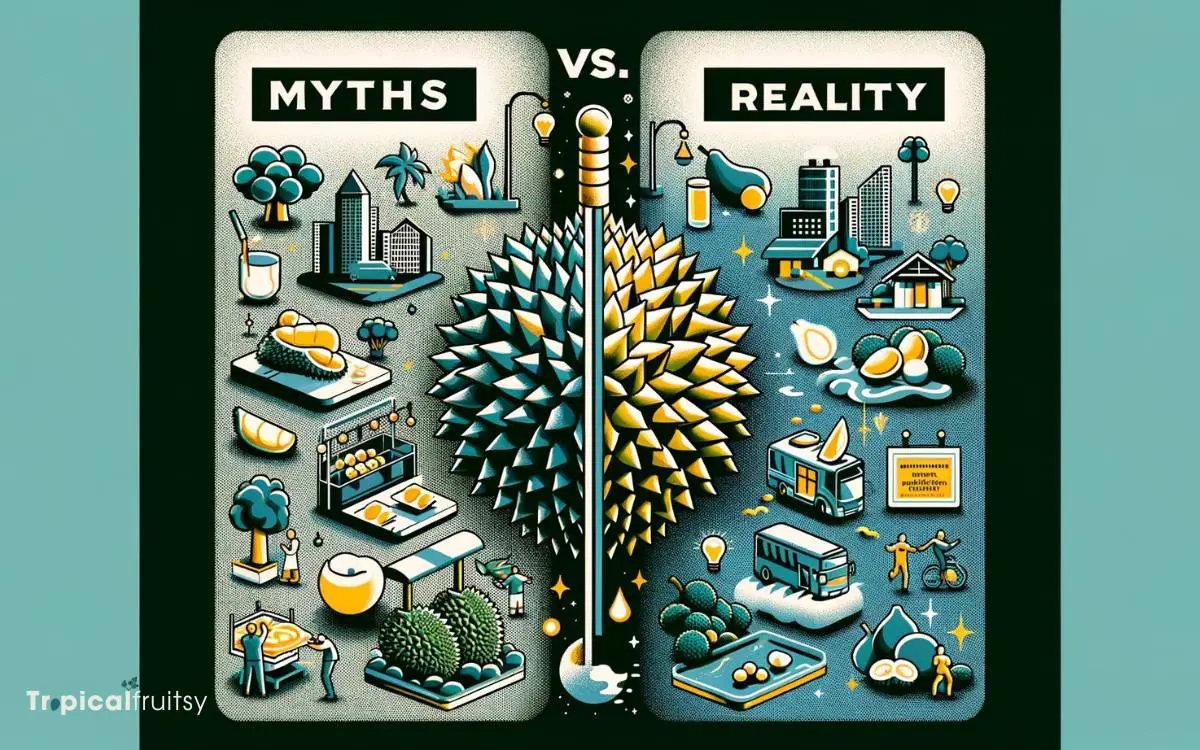
Despite common misconceptions, durian is not illegal in Singapore; however, its consumption is regulated in public spaces due to its pungent aroma. This distinction is crucial in understanding local regulations and cultural nuances.
The pervasive belief that durian is banned outright may stem from stringent rules governing its presence in certain enclosed, shared spaces such as mass transit systems and hotels, where its odor is considered intrusive.
These targeted restrictions are often interpreted as a blanket prohibition, which is not the case.
In reality, the fruit is widely available and celebrated in open-air markets and designated durian eateries.
The legal framework is designed not to criminalize the fruit but to balance its enjoyment with the public’s comfort and well-being.
Conclusion
Despite durian’s divisive status, Singapore’s precise policies permit the possession and consumption of this pungent produce, albeit with pertinent prohibitions in public places.
Regulations remain rigorous regarding its removal from public transport and hospitality havens to maintain a pleasant atmosphere. Consequently, compliance is critical to circumvent costly consequences.
Culturally conscious, the city-state offers sanctioned spaces for savoring durian, ensuring that enthusiasts can indulge in its unique ubiquity without upending urban etiquette.





